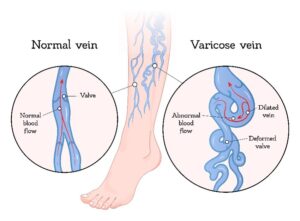What You Need to Know About Varicose Veins
Varicose veins are a common condition affecting many people. They are swollen, twisted veins that are visible just under the surface of the skin. Varicose veins are usually found in the legs, but they can also appear in other parts of the body. While they are often considered a cosmetic concern, they can also be a sign of an underlying medical condition. If you have varicose veins in New Jersey, count on the experts at the Medical Group of New Jersey to help you feel comfortable in your skin.
Veins that become enlarged, twisted, and swollen are referred to as varicose veins and are usually due to weakened or damaged valves. Valves in the veins help blood flow in the right direction, towards the heart. When these valves become weakened, blood can flow back into the veins and cause them to swell and become varicose. Typically appearing blue, red, or flesh-colored, varicose veins are often raised above the skin’s surface. This can be painful and uncomfortable, causing aching, cramping, and heaviness in the legs.
Causes and Symptoms of Varicose Veins
Varicose veins can be caused by several factors, including:
- Genetics: A family history of varicose veins can increase a person’s risk of developing them.
- Age: As people age, their veins may weaken, causing them to become varicose.
- Gender: Women are more likely than men to develop varicose veins.
- Pregnancy: During pregnancy, the body produces more blood, which can cause veins to enlarge. Additionally, the weight of the growing fetus can put pressure on the veins.
- Obesity: Excess weight can put pressure on veins, causing them to become varicose.
Symptoms of varicose veins can include:
- Swelling in the legs
- Itching and burning sensations
- Leg pain or cramping
- Skin changes, such as discoloration or thickening
- Ulcers near the ankle
How are Varicose Veins Treated?
Varicose veins can be treated using various methods, depending on their severity. Treatment options include:
- Compression stockings: Wearing compression stockings can help improve circulation and reduce swelling.
- Sclerotherapy: A minimally invasive procedure that involves injecting a solution into the varicose veins, causing them to collapse and fade.
- Endovenous laser therapy (EVLT): A minimally invasive procedure that uses laser energy to collapse the varicose vein.
- Radiofrequency ablation: A minimally invasive procedure that uses heat to collapse the varicose vein.
- Vein stripping and ligation: A surgical procedure that involves removing the varicose vein.
Our vascular specialists are trained to diagnose and treat varicose veins using the latest technologies and techniques. We offer a comprehensive range of treatments to help alleviate the discomfort and improve the appearance of varicose veins.
If you are experiencing symptoms of varicose veins in New Jersey, contact the Medical Group of New Jersey and schedule your appointment.